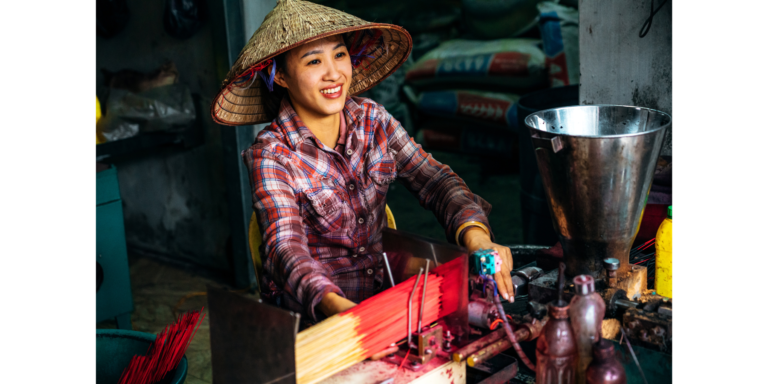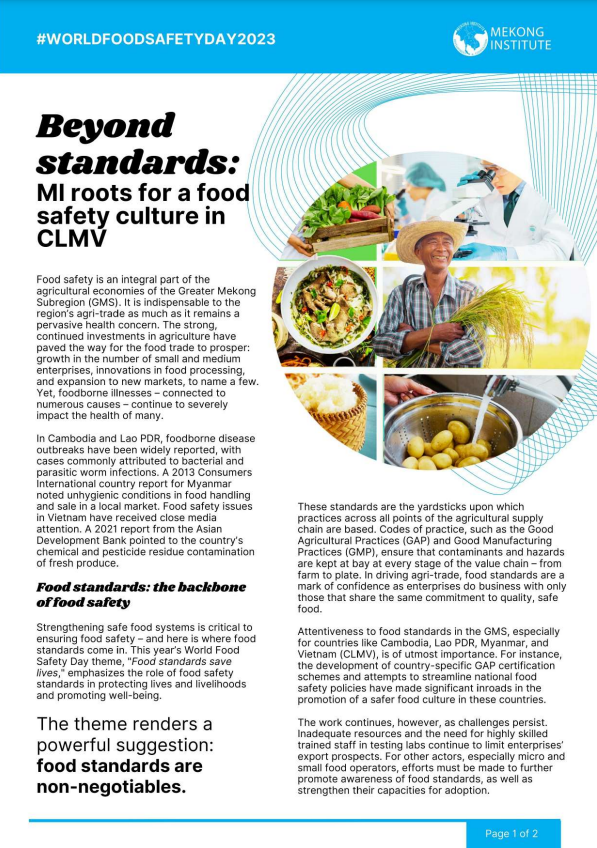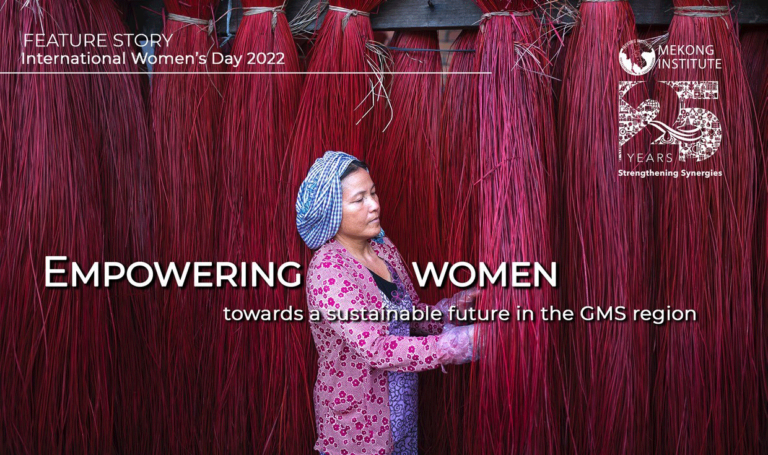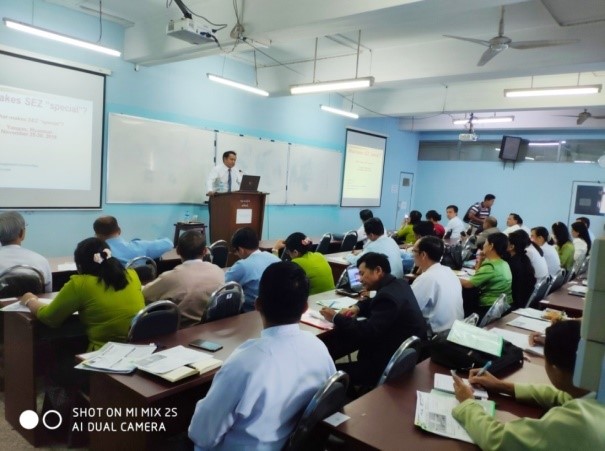
Nearly a year after the World Health Organization declared the end to COVID-19 as a global health emergency, women and girls continue to bear the brunt of the pandemic’s scarring effects. Without intervention, experts anticipate further regression if resources would remain inadequate for gender equality and inclusion (GEI) efforts.
Indeed, COVID-19 slowed down progress toward the global goals for sustainable development, even reversing gains in women’s rights and opportunities. The gender pay gap widened while unpaid care burden on women increased. Women’s participation in government and resource management, as well as in science, technology, and innovation remains unequal due to deeply entrenched gender stereotypes and barriers. The needs of women in urban areas are frequently overlooked, let alone those of other vulnerable groups such as indigenous women, women with disabilities, and out-of-school youths. Scarring also manifests in the form of learning losses among girls, especially those from rural areas and minority ethnic communities, exacerbating disparities in education due to lockdown induced school closures. Out-of-school girls face greater risks such as violence, child labor, child marriage, and early pregnancy.
In the Greater Mekong Subregion (GMS), a gender assessment found that despite notable progress in GEI since the start of the millennium, women have yet to achieve full and equal participation across all social and economic spheres. While most GMS countries have shown improvement in reducing gender inequality, challenges persist, particularly in Lao PDR and Myanmar, whose Gender Inequality Index (GII) values are higher than the global average, based on the United Nations Development Program’s 2021 GII data, a composite metric of gender inequality that considers the dimensions of reproductive health, empowerment, and the labor market.
A separate rapid gender analysis conducted in 2020 during the pandemic highlighted significant under-representation of women in national governments and leadership positions in trade unions, a trend also observed in COVID-19 task forces and committees throughout the region.
The price tag for gender equality and inclusion
These challenges are further compounded by conflicts, the climate crisis, and rising fuel and food prices, leading to anticipated curbs in public spending in many countries by 2025. Unfortunately, austerity measures disproportionately impact women and crowd out public spending on essential services and social protection, disrupting access to healthcare, including family planning. The impact extends to funding for civil society and grassroots organizations in the GMS, resulting in the suspension of critical services, particularly for at-risk groups.
Globally, lackluster commitment to achieving Sustainable Development Goal (SDG) 5 on gender equality is apparent in the stagnant funding allocation for related initiatives, currently standing at only 4-5% of bilateral aid. If sustained, this trend will result in a significant shortfall. To bridge this gap, the United Nations Entity for Gender Equality and the Empowerment of Women or UN Women estimates that an additional USD 360 billion per year is needed to meet the annual requirement of USD 6.4 trillion for gender equality measures across 48 developing countries, including GMS nations. Achieving gender equality by 2030, especially in crucial areas like poverty and hunger alleviation, as well as promoting equal participation of women in society, therefore, hinges on addressing this funding shortfall. If governments are serious in reducing inequality, gender-responsive financing should be considered in earnest to allow transformational results for women, girls, and societies.
It is thus a deliberate move for the UN Women to sound the alarm on much-needed funding for gender-focused measures through this year’s celebration of the International Women’s Day. “Invest in women: Accelerate progress” is UN Women’s battle cry, enjoining all sectors to allocate more for women empowerment and social inclusion not just as a cross-cutting theme but as a targeted initiative. It is a call for governments to up their game by financing GEI through national budgets and fiscal policies. UN Women is collaborating with international financial institutions and the private sector to explore innovative financing mechanisms, such as gender bonds, to support gender equality projects. Efforts are underway to encourage increased investment in gender equality, influence policy development, and direct funding towards this critical agenda.
MI’s share in the bill
Mekong Institute (MI), an intergovernmental organization, plays a pivotal role in advancing gender development goals within the GMS. At the core of MI’s initiatives lies a dedication to GEI, highlighted in its Strategic Plan 2021-2025, where social inclusion and vulnerability are key themes. MI is committed to supporting marginalized groups such as rural women and smallholder farmers, promoting gender mainstreaming for inclusive development, and enhancing women’s access to knowledge, skills, finance, markets, and economic empowerment, particularly in agriculture and trade. MI aims to strengthen safety nets through dialogues with GMS governments, the private sector, and stakeholders.
The ‘MI Approach’ underscores inclusivity by enhancing the capacity and opportunities of individuals disadvantaged due to their identity to engage in development processes. This is achieved through promoting and assessing engagement by gender and nationality, ensuring equal participation of women and minorities in MI’s training programs, as well as project planning and implementation. True to its core, MI’s capacity development (CD) events have evolved to ensure gender balance, with a notable increase in female participation over the last four years. The organization’s annual reports record a significant rise in female engagement in 2020, 2021, 2022 and 2023, resulting in an annual average of 50% gender-balanced participation across programs compared to only 30% to 35% female participation in the early 2000s until around 2015. MI substantially invests in GMS stakeholders through CD programs that fully cover participants’ training and logistical needs, such as accommodation, transportation, training kits, resource person fees, meals, daily allowances, and travel and health insurance. Altogether, MI spends as much as USD 1,500 per individual for a weeklong training course. In 2023 alone, MI spent around USD 2.5 million for programs and projects delivery and administration, benefitting 1,530 direct participants from GMS countries across 46 CD events. About half of these participants (49.5%) are female, reflecting MI’s commitment to gender inclusivity. These direct participants organized 262 CD events, reaching 12,282 indirect training beneficiaries, with 57.3% female representation among them.
The organization’s commitment to GEI is equally evident in how it prioritizes diversity in its workforce, advocating non-discrimination and fair treatment in all employment matters. Last year, MI comprised 48 staff members with a distribution of 40% male and 60% female employees, representing 13 nationalities including all six GMS member states in a showcase of the organization’s regional inclusivity. About half of leadership roles at MI are held by women, with at least one woman being part of the senior management team.
Through its programs, projects, and collaborations with relevant stakeholders and institutions, MI has positioned itself as a champion for women empowerment, contributing significantly to GEI in the GMS. MI has supported regional gender equality initiatives by creating opportunities for women to lead in preserving agrobiodiversity and advancing climate-smart agriculture. Collaborating with organizations like the Stockholm Environment Institute, the Swedish Government, the New Zealand Aid Programme, and the Lao PDR Agrobiodiversity Platform, MI hosted forums highlighting the roles of rural and indigenous women as custodians of traditional knowledge.
MI strengthened policymakers’ capacity in gender equality through partnerships with organizations like the Thailand International Cooperation Agency (TICA), implementing international training courses aimed at combating gender-based violence (GBV) and enhancing women’s representation and participation in society. MI and TICA also worked together for the promotion and protection of the rights of migrant workers, women, and children in the GMS.
Thailand’s best practices in promoting women’s participation in political and economic spheres figured in a knowledge-sharing event on GBV that MI organized for international audiences from 18 countries. MI facilitated a similar training supported by the People’s Government of Yunnan Province of P.R. China, involving 39 government officials and development leaders, focusing on establishing mechanisms against GBV and implementing responsive budgeting practices for equitable resource allocation.
MI’s project with the International Development Research Centre (IDRC) aimed to enhance the export business capacity of women entrepreneurs in Cambodia, Lao PDR, Myanmar, and Viet Nam (CLMV), while another initiative provided training to over 20 women entrepreneurs and business development service (BDS) providers in promoting women entrepreneurship for export business. MI and IDRC also worked together on a publication that explored evidence of women empowerment in small and medium-sized enterprises.
Working with the Korea International Cooperation Agency (KOICA), MI produced a “Baseline Study on Women-Led SMEs” and an “Export to Korea Study Report” as part of the “Market Access through E-Commerce Promotion for Women-led SMEs” project. These initiatives further strengthen MI’s critical role in supporting women entrepreneurs through e-commerce, organizing practical sessions to enhance their managerial and e-marketing skills, and expanding their networks for international market entry.
Despite current circumstances, hope for women and girls is high with various regional plans being adopted to champion GEI such as the ASEAN Gender Mainstreaming Strategic Framework (AGMSF) and the GMS Economic Cooperation Program Strategic Framework 2030 (GMS-2030) where gender equality is recognized as a crucial cross-cutting theme. For its part, MI works to incorporate GEI in its strategies toward greater regional cooperation and integration by developing and implementing a Gender Action Plan (GAP) in all of its programs and projects. MI will use this GAP to monitor and evaluate how well its interventions are contributing to gender equality.
Undeniably, sustainable development hinges on integrating gender perspectives across all socioeconomic endeavors, and in MI’s case, in program and project design, budgeting, and implementation. With MI on the ground championing the cause for women, more conscientious efforts will be made to include women in the regional development agenda. Moving forward, MI is committed to paying closer attention to gender balance and inclusion in its programs, redoubling efforts and investing more in women to counter the regressive impacts of global shocks and assure long-term development results for GMS communities.






